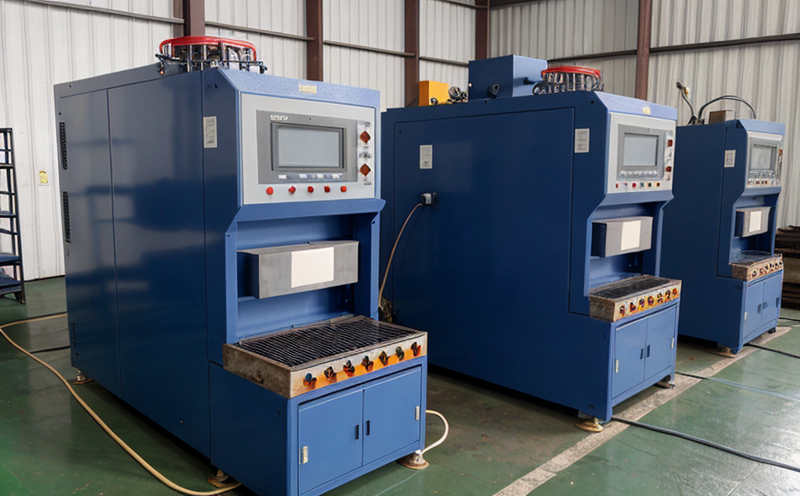EN 10204 Metallic Materials Mechanical Properties Testing
The EN 10204 standard is a cornerstone in the mechanical testing of metallic materials, ensuring that manufacturers and suppliers can verify the quality and integrity of their products. This service focuses on the mechanical properties testing required by EN 10204-3 for metallic materials such as steel, iron, brass, and other alloys used in industrial manufacturing.
The primary objective is to assess the mechanical behavior of these materials under various stress conditions, ensuring they meet specified performance criteria. This comprehensive approach helps manufacturers comply with international standards, enhancing product reliability and customer trust.
EN 10204-3 specifically addresses the tensile testing of metallic materials, which is critical for evaluating the strength and ductility properties of these materials. The standard provides detailed guidelines on specimen preparation, test procedures, and the acceptance criteria that ensure accurate results. This service not only ensures compliance with EN standards but also supports ongoing quality control processes in industrial manufacturing.
The testing process involves several steps, starting with careful selection and preparation of the specimens. Specimens are typically cut from production batches or specific areas to represent the material's characteristics accurately. Proper handling during specimen preparation is crucial as it directly impacts the accuracy of subsequent test results.
Once prepared, the specimens undergo tensile testing using specialized equipment designed to apply controlled stress until failure occurs. This process measures key parameters such as yield strength, ultimate tensile strength (UTS), elongation, and reduction in area, providing a comprehensive overview of the material's mechanical properties.
The results from these tests are then analyzed and reported according to EN 10204-3 guidelines. The report includes detailed information on the test setup, specimen dimensions, applied loads, failure points, and calculated mechanical properties. This data is essential for quality control and can be used by manufacturers to optimize production processes or identify areas requiring improvement.
Compliance with EN 10204-3 is particularly important in industries where material integrity is paramount, such as aerospace, automotive, construction, and manufacturing sectors. By ensuring that materials meet the specified mechanical property requirements, this service supports the development of high-performance products capable of meeting stringent industry standards.
Our laboratory uses advanced equipment and experienced technicians to conduct these tests efficiently and accurately. The use of state-of-the-art facilities ensures reliable results that are repeatable and consistent with international norms.
| EN 10204-3 | Description |
|---|---|
| Tensile Testing Specifications | Details on specimen preparation, test setup, and acceptance criteria. |
| Test Equipment Requirements | Standardized equipment specifications for accurate results. |
| Accepted Materials | Description |
|---|---|
| Steel, Iron, Brass | Common metallic materials used in industrial manufacturing. |
| Alloys | Mixtures of metals designed for specific applications. |
Why It Matters
The mechanical properties of metallic materials play a crucial role in determining their suitability for various industrial applications. By ensuring that these materials meet the stringent requirements set forth by EN 10204-3, manufacturers can enhance product reliability and safety.
- Enhanced Product Reliability: Meeting mechanical property standards ensures that products perform consistently under expected conditions, reducing the risk of failure in critical applications.
- Improved Safety Standards: Ensuring compliance with international norms like EN 10204-3 helps prevent accidents and injuries associated with poorly performing materials.
- Competitive Advantage: Meeting these standards can differentiate a company's products from competitors, enhancing market position and customer satisfaction.
In industries such as aerospace and automotive, the mechanical properties of metallic materials are critical for ensuring the safety and efficiency of end-products. By adhering to EN 10204-3, manufacturers can build trust with customers and regulatory bodies alike.
The testing process also supports continuous improvement efforts within manufacturing processes. By identifying any deviations from expected results, companies can make informed decisions about process adjustments or material selection.
Applied Standards
| Standard | Description |
|---|---|
| EN 10204-3:2019 | Tensile testing of metallic materials, including specimen preparation and acceptance criteria. |
| ISO 6892-1:2019 | General requirements for tensile testing of metallic materials. |
The EN 10204-3 standard provides detailed guidelines on specimen preparation, test setup, and acceptance criteria. The process ensures that the mechanical properties measured are accurate and consistent with international norms. Compliance with these standards is essential for manufacturers looking to ensure product quality and safety.
ISO 6892-1:2019 complements EN 10204 by providing general requirements for tensile testing, which helps standardize the methodology across different industries. Together, these standards form a robust framework for mechanical property testing of metallic materials.
Competitive Advantage and Market Impact
- Meeting Global Standards: Compliance with EN 10204-3 helps manufacturers meet global regulatory requirements, opening up new markets and opportunities.
- Enhanced Product Quality: Ensuring mechanical properties meet specified standards can lead to higher customer satisfaction and loyalty.
- Informed Decision-Making: The detailed testing process provided by this service allows manufacturers to make informed decisions about material selection and process optimization.
The ability to provide accurate, reliable test results based on EN 10204-3 can give companies a significant competitive edge. In markets where product quality is paramount, such as aerospace or automotive, meeting these standards can set a company apart from its competitors.
By ensuring that materials meet the specified mechanical property requirements, this service supports ongoing quality control processes in industrial manufacturing. This not only enhances product reliability but also helps manufacturers build trust with customers and regulatory bodies alike.





